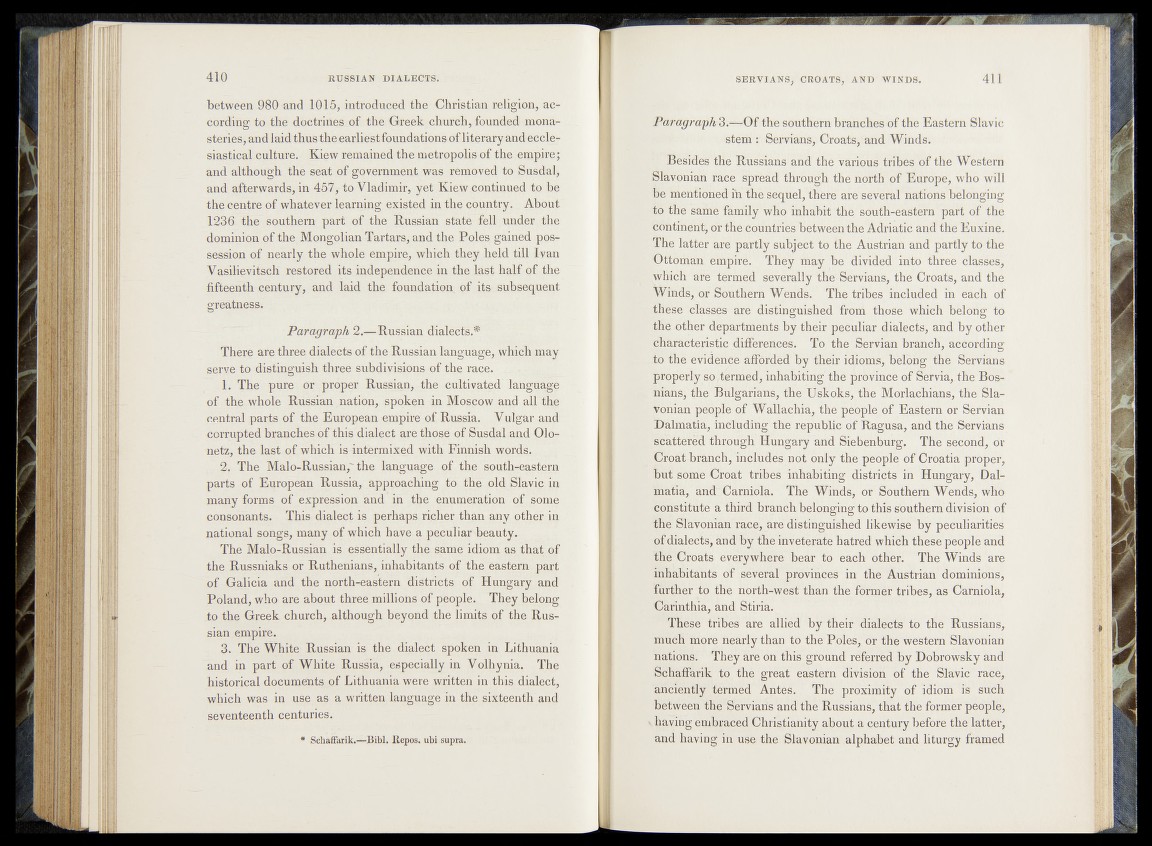
between .980 and 1015, introduced the Christian religion, according
to the doctrinegof the Greek church, founded monasteries,
and laid thus the earliest foundations of literary and ecclesiastical
culture. Kiew remained the metropolis of the empire;
and although the seat of government was removed to Susdal,
and afterwards, in 457, to Vladimir, yet Kiew continued to be
the centre of whatever learning existed in the country. About
1236 the southern part of the Russian state fell under the
dominion of the Mongolian Tartars, and the Poles gained pqs-r
session of nearly the whole empire, which they held till 1-yan
Vasilievitsch restored its independence in the last half of the
fifteenth century, and laid the foundation, pf its subsequent
greatness.
Paragraph 2.—Russian dialects.*
There are three dialects of the Russian language, which may
serye to distinguish three subdivisions of the race.
1. The pure or proper Russian, the cultivated language
of the whole Russian nation, spoken in Moscow and all" the
central parts of the European empire of Russia, Vulgar anp;
corrupted branches of this dialect are those of S u s d a l ,and Olo-
netz, the last of which is-intermixed with Finnish words,, j
2. The Malo-Russian," the language of the south-eastern
parts e f European Russia, approaching to the ojdSlavic in
many forms of expression and in the enumeration of .some
consonants. This dialect is perhaps richer than any other ip
national songs, many of which have a pgeuliarheauty.
The Malo-Russian is essentially the, same idiom as that pf
the Russniaks or Ruthenians, inhabitants of the eastern part
of Galicia and the north-eastern districts of Hungary and
Poland, who are about three millions of people. They belong
to the Greek church, although beyond the limits of the Russian
empire.
3. The White Russian is the dialect spoken in Lithuania
and in part of White Russia, especially in Volhynia. The
historical documents of Lithuania were written in this dialect,
which was in use as a written language in the sixteenth and
seventeenth centuries.
* Schaffarik.—Bibl. Repos, ubi supra.
Paragraph 3.—Of the southern branches of the Eastern Slavic
■ astern : Servian's, Croats,'and Winds.
Besides tne Russians and the various tribes of the Western
Slavonian race spread throu|pi the north of Europe, who will
|fe mentioned in the sequel, there are several nations belonging
to We’saihte family who i'nhabit'the south-eastern part of the
«fontinenr, or the countfiës hétweèn the Adriatic and the Euxine.
p l h partly sqbjëpt to thé Austrian and partly to the
Ottoman empirë.,J ’ They may be dmuM into three classes^
whichju.re termed severally the Croat’s, and the
Winds1, or Southern Wends, The tribes included in each óf
|n e |e v*cïasges' are distinguished'from th p l|r which.1 belong to
the other Departments by fheir;peculiar,dialects, and by other
CThracteristic differences. To the Servian branch, according
-to the evidfmpe afforded 'ïfy their idioml, ollohg the Servians
'properlyfsö/termed, inhabiting the provnme ?ofSer via, the Bosnians,
the BulgariansJWeHlskoles'! Morlaichiansf the Sla*
yonian people of Wallachia, the p e b p l^ i1 Eastern or Servian
Dalmatia, including tKe" republic^r Ragusa, and the Servians
^battered through Hungary and Siemaibiirg. TheJ!s;«^S or
Croat branch/'meludes nbr only the pèople of Croatia proper,
but some Croat tribes inhabiffi^',-districts in Hungary, Dalmatia,
and:rCarniola. The Winds, w Southern Wend^who
constitute a third branch belonging to this sbuthem division of
the Slavonian race, are distinguished likewise by’ pe'cani arities
p f dialects, and by the inveterate hatred1 which thffse people and
thé Croats everywhere bear to each other. The Winllrfare
inhabitants of several“ provinces in the Austrian dominions,
further to the horth-west than the formér tribes; as Camiola)
Carinthia, and Stiria.
These tribes are allied Jby th e ir dialects to the Russians,
much more nearly than to the Poles, or the western Slavonian
nations. They are on this ground referred by Ddbrowsky and
Schaffarik to the great eastern division of the Slavic racë,
anciently termed Antes. The proximity of idiom 're such
between the Servians and the Russians!) that the former people,
paving embraced Christianity about a centufwqyQfe the latter^1
and having in use the Slavonian .alphabet and liturgy framed